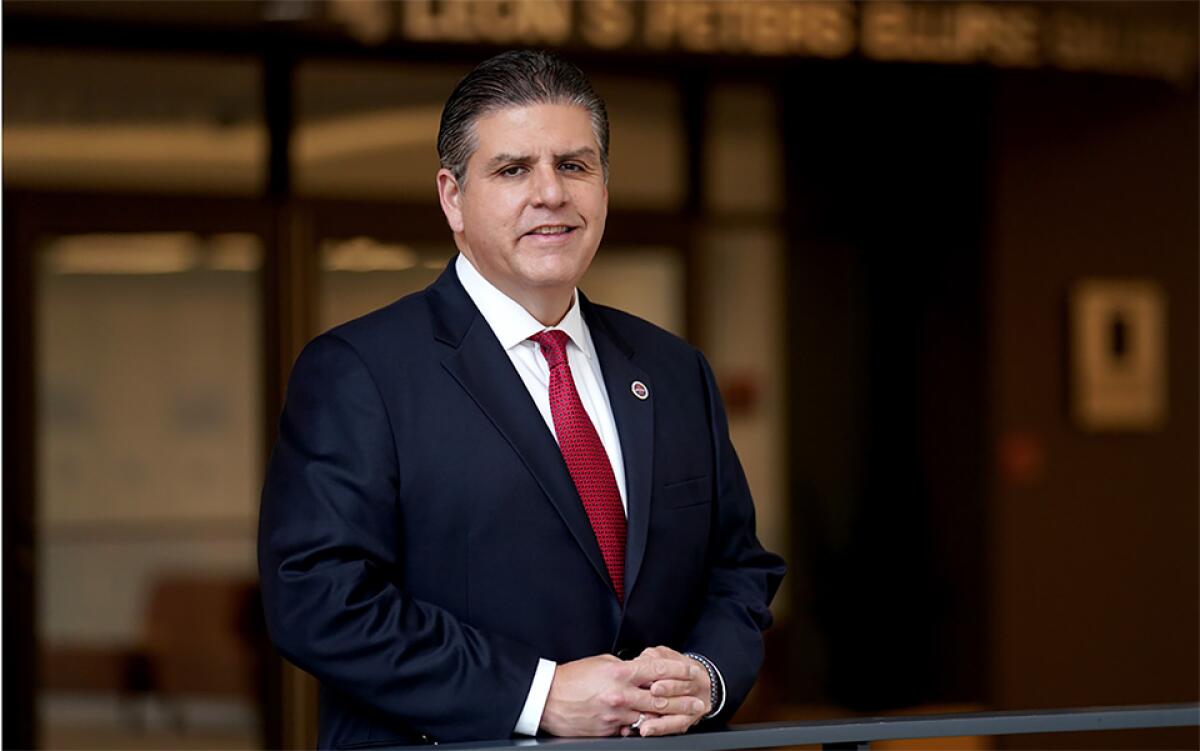Editorial: Cal State’s festering problems can’t be hidden any longer

- Share via
Recent allegations that former CSU Chancellor Joseph I. Castro mishandled sexual harassment complaints while president of Fresno State exposed questionable management at Cal State that goes way beyond a single problematic administrator.
Castro, who resigned last month after a USA Today story revealed that he failed to take serious action to address years of allegations lodged against one of his staffers, will be paid more than $400,000 over the next year and receive a plush housing allowance and benefits. And, as an investigation by the L.A. Times has detailed, he wasn’t the only departing executive to get such a sweet perk. CSU has paid out more than $4 million in salary and benefits since 2006 to a handful of former executives as part of CSU’s Executive Transition Program.
It’s time for a thorough review by an impartial outside consultant of Cal State’s policies and programs regarding misconduct by top administrators and compensation perks for executives. It appears the rights and needs of students and staff have been overridden repeatedly by special consideration for executives.
CSU has paid more than $4 million in salary and benefits to a small group of former executives including former Chancellor Joseph I. Castro, who resigned last month
It started with sexual harassment and bullying complaints spanning years against Fresno State’s vice president of student affairs, Frank Lamas. News reports revealed evidence that Castro had downplayed the complaints against Lamas and failed to take serious action. When Castro had little choice but to get Lamas to leave, he sent him off with a glowing letter of recommendation without disclosing what had happened to students, staff or the board of trustees when they were considering him for the chancellor position in 2020.
Soon after Castro’s alleged missteps were revealed he resigned. But that was only the start of revelations about Cal State’s inner workings.
It’s frustrating enough that the university system will pay Castro about $400,000 over the coming year to act as a consultant to the university. But under a policy that allows university administrators who resign to become professors, Castro can join Cal Poly San Luis Obispo as a professor if he chooses to do so in coming months.
It’s regrettable that even though Castro has the right to return, the university appeared unable to negotiate a resignation settlement that would have him leave the university. If he started teaching at San Luis Obispo, his presence would undoubtedly keep the turmoil at high pitch.
Any review must also question the continued existence of the transition program in which chancellors, vice chancellors and campus presidents who resign are paid a salary for a year or more if they might become professors within the university system. During their transition time, they are on call for consultation, providing institutional memory and advice when needed, according to a Cal State spokesman. Castro’s predecessor, former Chancellor Timothy P. White, who stepped down in December 2020, is still receiving a salary in his transition period of two years.
The trustees had little choice but to urge Chancellor Joseph I. Castro to leave after he mishandled sexual harassment allegations at Fresno State. But Cal State needs to examine its own shortcomings.
That’s a lot of money to pay for an amorphous job for people who have resigned from their highly paid positions in either honor or disgrace. True, the payouts are small compared with Cal State’s $12.4-billion budget, but they send a bad message about the university system’s priorities. Why don’t other staffers get paid for a year of “providing institutional memory” when they move to a new job within the university? How much institutional memory would Castro have after just a little more than a year on the job?
It’s not that Castro isn’t entitled to some kind of severance pay. He has served California’s public university systems — both Cal State and the University of California — for many years, and by all accounts accomplished some real improvements. But a year of an executive salary plus generous housing allowance for a job of dubious value to students, while Castro waits to decide whether to join the Cal Poly faculty, is a luxury that no college, especially a public one, should embrace.
Add to this the inappropriate initial response in support of Castro by board Chair Lillian Kimbell (since removed from Cal State’s website) and there are too many signs of management who sought to sweep thorny problems under the rug and maintain an everything’s-OK façade. The university’s leaders should know that the days when they can hide serious problems, especially those involving sexual harassment, have ended.
More to Read
A cure for the common opinion
Get thought-provoking perspectives with our weekly newsletter.
You may occasionally receive promotional content from the Los Angeles Times.












